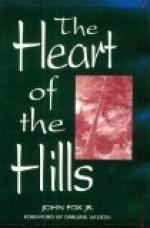An hour later, John Burnham came over, told Jason to stay with his mother, and went forthwith to town. Within a few hours all was quickly, quietly done, and that night Jason started with his mother and the body of Mavis’s father back to the hills. The railroad had almost reached the county-seat now, and at the end of it old Jason Hawn and Mavis were waiting in the misty dawn with two saddled horses and a spring wagon. The four met with a handshake, a grave “how-dye,” and no further speech. And thus old Jason and Martha Hawn jolted silently ahead, and little Jason and Mavis followed silently behind. Once or twice Jason turned to look at her. She was in black, and the whiteness of her face, unstained with tears, lent depth and darkness to her eyes, but the eyes were never turned toward him.
When they entered town there were Hawns in front of one store and one hotel on one side of the street. There were Honeycutts in front of one store and one hotel on the other side, and Jason saw the lowering face of little Aaron, and towering in one group the huge frame of Babe Honeycutt. Silently the Hawns fell in behind on horseback, and on foot, and gravely the Honeycutts watched the procession move through the town and up the winding road.
The pink-flecked cups of the laurel were dropping to the ground, the woods were starred with great white clusters of rhododendron, wood-thrushes, unseen, poured golden rills of music from every cool ravine, air and sunlight were heavy with the richness of June, and every odor was a whisper, every sound a voice, and every shaking leaf a friendly little beckoning hand—all giving him welcome home. The boy began to choke with memories, but Mavis still gave no sign. Once she turned her head when they passed her little log school-house where was a little group of her pupils who had not known they were to have a holiday that day, and whose faces turned awe-stricken when they saw the reason, and sympathetic when Mavis gave them a kindly little smile. Up the creek there and over the sloping green plain of the tree-tops hung a cloud of smoke from the mines. A few moments more and they emerged from an arched opening of trees. The lightning-rod of old Jason’s house gleamed high ahead, and on the sunny crest of a bare little knoll above it were visible the tiny homes built over the dead in the graveyard of the Hawns. And up there, above the murmuring sweep of the river, and with many of his kin who had died in a similar way, they laid “slick Steve” Hawn. The old circuit rider preached a short funeral sermon, while Mavis and her mother stood together, the woman dry-eyed, much to the wonder of the clan, the girl weeping silently at last, and Jason behind them—solemn, watchful, and with his secret working painfully in his heart. He had forbade his mother to tell Mavis, and perhaps he would never tell her himself; for it might be best for her never to know that her father had raised the little mound under which his father slept but a few yards away, and that in turn his hands, perhaps, were lowering Steve Hawn into his grave.




